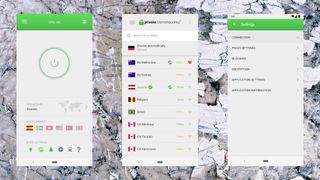What's next for Private Internet Access in 2024?
Private Internet Access shared its views and plans for the next year

As we approach a new year, once again the time has come to reflect on the events of the last 12 months and, perhaps, draw some predictions for the upcoming 2024. When it comes to doing so for the digital privacy landscape, though, who's better suited for a VPN service provider to walk us through this journey?
We then decided to meet with some of the people who cope with these matters daily to keep Private Internet Access (PIA) up for this security challenge. Specifically, I talked with PIA's Senior Communications Manager Charlotte Scott, PIA's Head of Product Himmat Bains, and Jose Blaya, Director Of Engineering at Kape Technologies (PIA's parent company also owns ExpressVPN and CyberGhost).

Placed in fourth position on our best VPN ranking list, Private Internet Access (PIA) is a fully open-source software that has proven its no-logs claims in court not once, but twice. A fully customizable service, it's perfect for both beginners and cybersecurity experts.
Talking about the company's 2023 achievements, what most stood out for me was knowing that female engineers make up more than half of the PIA's team (60%). The provider also confirmed its commitment to promoting digital rights by launching the Privacy Pass initiative to give free VPN subscriptions to the press and NGOs. It also launched the Dynamic Island functionalities for iOS 17—something that, honestly, I haven't seen other providers doing yet.
The team also gave me a preview of the product roadmap for 2024, and I have to say that there are a few exciting improvements upcoming. PIA's engineers have been working hard to find a solution to a problem gripping the industry: making split tunneling available for MacOS. PIA is then going to be the first provider offering such functionalities starting in January.
A new improved Android VPN app will follow suit in February—engineers rebuilt it from scratch for better usability and accessibility—together with a dedicated Apple TV app. The new Android users' interface will then be implemented across all platforms later in the year. PIA will also start offering multiple dedicated IP addresses. Starting with two per account, the plan is to increase these based on users' feedback.
Below you can find more about the driving reasons behind PIA's 2024 plans. The interview has been edited for length and clarity.

Charlotte is a dedicated digital rights advocate and experienced comms professional. With a firm belief in the importance of user education and empowerment, Charlotte continues to lead activities promoting the importance of internet security and user privacy, including awareness-raising and policy-influencing campaigns.

Himmat is an experienced product manager focused on improving user experience, accelerating product development, and finding cutting-edge solutions to the challenges faced by today’s digital society. He leads PIA’s product team and brings with him a wealth of experience having worked for both new and established companies across the tech sector to drive success.

Jose leads a globally distributed and remote team of engineering managers, playing a pivotal role in defining the vision and strategy for the organization's VPN client applications, as well as the user experience. He has almost 20 years of experience in software engineering, with a strong background in mobile platforms. He is also a Certified Scrum Product Owner with Scrum Alliance.
What do you think have been the most important innovations in digital privacy over 2023?
Himmat: We’ve seen the digital privacy landscape continue to evolve rapidly in 2023 and PIA is committed to continuing to provide users with robust and up-to-date privacy protection to protect their digital footprint.
Ongoing development within this area is a move towards empowering users to take control of their own privacy, with improved tools and interfaces that allow users to have more control over their data, making it easier to manage privacy settings and consent. Enabling customers to take control of their privacy is of course something that has been at the heart of PIA’s product from the start, and our advanced customization options allow customers to do just that. However, it’s promising to see this approach start to be used by more digital platforms and services.
Jose: 2023 has also seen a significant leap forward in the field of quantum computing, which uses quantum mechanics to find new ways of processing data and solving complex problems at great speed. Whilst many of the capabilities of quantum computing are still unknown, it will undoubtedly have a huge impact across the technology sector, as well as the cybersecurity and digital privacy landscape.
The widespread rollout of AI technology has been an important development in 2023, and has been seen by many as a threat as much as an opportunity for innovation. From indiscriminate data gathering to the potential for the spread of fake news and deep fakes, AI has certainly raised the digital privacy stakes.
As individuals, we need to continue to take steps to protect our data and keep our personal information safe. This includes not only making sure we are using appropriate digital privacy tools and precautions, but also thinking about exactly what we are happy to share online in the first place and questioning the information and answers we are presented with.

What about in terms of regulations?
Charlotte: Laws and regulations have struggled to keep up with the constantly changing digital landscape and new technologies emerging in 2023. It’s important that we continue to learn as much as possible about developments such as AI and quantum computing, and for sensible steps to be taken to ensure the regulations we have in place can still protect people’s privacy and online security.
PIA’s 2023 privacy report exposed the continued imbalance of digital privacy protection across the US. Some states such as Connecticut, Colorado, and Virginia showed promising improvements in this area with the introduction of their own comprehensive data privacy laws.
Elsewhere, the introduction of laws such as those mandating digital age verification, in addition to legislation such as the RESTRICT Act, saw many states drifting further from the pursuit of improved digital privacy.
How did PIA’s 2023 roadmap reflect all of this?
Himmat: In 2023 we worked to make sure our product was working as smoothly and effectively as possible and we continued to monitor for new and existing threats, deploying patches quickly and smoothly when needed.
Looking at ways in which we could continue to meet our users’ growing privacy needs, earlier this year we announced that a PIA subscription would now include unlimited simultaneous device connections. With the growing reliance on multiple internet-connected devices for everyone’s day-to-day needs, we understood people needed broader protection to keep their widening digital footprint private.
While PIA initially gave 10 device connections, more than most VPNs on the market, in March of 2023 we made the decision to offer unlimited device connections per subscription in order to provide better value to both new and existing users.
PIA also continued to look for ways to give our users the extra flexibility and accessibility they need in a rapidly changing digital landscape. In October we expanded our server network, including boosting the number of dedicated IP locations offered to include popular hubs such as Brussels, Stockholm, Houston, and San Jose (Silicon Valley).
Dedicated IP addresses provide users with a unique IP, in order to give them a smoother online experience while maintaining their privacy. As always, we remain dedicated to safeguarding our users' online activities and protecting their personal data.
Exciting news! Introducing the PIA Privacy Pass, our initiative to safeguard digital rights. We're offering free PIA VPN subscriptions to journalists, nonprofits, and NGOs in high-risk areas. Learn more at: https://t.co/fPGdpNPwCmDecember 12, 2023
What are your predictions for the overall 2024’s digital privacy landscape?
Himmat: Consumers are becoming more aware of the threats to their digital privacy and are continuing to be proactive in protecting themselves. I predict this trend will continue into 2024 and hope to see a continued drive towards better education and understanding of cybersecurity and digital privacy.
However, I also predict that both advertising companies and cybercriminals will inevitably try harder to gain access to customer data, and with more sophisticated technologies being developed all the time it will be vital to stay one step ahead of the latest threats.
Where does PIA’s product plans for next year stand within these?
Himmat: In 2024, we’re working to provide customers with the best possible privacy protection across all their devices, with PIA being supported on even more platforms including the introduction of a native Apple TV app.
Moreover, we’re bolstering our core features such as split tunneling, and we’re preparing to roll out split tunneling on MacOS so our customers have the flexibility of adding that layer of VPN protection to suit their needs. We’re also improving our user interface to help our customers navigate our platforms with even greater ease.

Could you tell me a little more about PIA's decision to prioritize certain features over others?
Jose: Overall our rationale for which features to prioritize is driven by two key principles: the feedback we receive from our customers; and the impact the feature will have from a security and privacy perspective.
Whilst we know some features might have more potential to generate revenue or have greater marketing value, our team is committed to making sure we continue to prioritize tasks such as updating OpenSSL libraries, bumping libraries to the latest most secure version, or improving the user experience in areas that will add greater privacy or flexibility for the customer.
For example, why have you prioritized some features over an Apple TV app which some competitors have already released??
Himmat: As a team we prioritised working on MacOS split tunnelling prior to commencing work on the Apple TV app. Our rationale for this was that our customers had continued to request that this feature be made available again, with daily requests for it across social media and through our customer support channels.
We committed to working on it prior to the Apple TV announcement and we wanted to give our customers the much-requested capability to manage their VPN tunnel on MacOS. While our customers already have ways to use our VPN product in Apple TV via Smart DNS, bringing MacOS Split Tunneling to our users is key to continuing to offer them the most configurable VPN in the market.
Thankfully we’re nearing the Beta launch of MacOS split tunnelling and our Apple TV is making good progress too with an expected February Beta launch.

As new tech like AI and quantum computing spread wider, do you think we should rethink our current approach to data privacy?
Jose: The advancement of technologies like AI and quantum computing will certainly necessitate a re-evaluation of our current approach to data privacy. These technologies, especially quantum computing, have the potential to challenge the encryption methods we currently rely on to secure data, including the encryption used in VPN tunnels. However, it's not just about the risks; these technologies also bring new opportunities for enhancing security.
At PIA, we believe it's crucial to start preparing now to protect our customers both in the present and in the future. This involves developing and implementing encryption that can withstand the capabilities of quantum computing.
While it's challenging to predict exactly what new technologies will emerge and how they will impact data privacy, our commitment is to continuous innovation. We are dedicated to staying ahead of these changes, ensuring that we always offer the highest level of protection to our users.
As we step into an era of more advanced technologies, our approach to data privacy must evolve. It should be proactive, not just reactive, adapting to potential future challenges while leveraging new opportunities to strengthen data protection. This way, we can ensure that our users' privacy and security are always safeguarded, no matter what the future holds.
Disclaimer
We test and review VPN services in the context of legal recreational uses. For example: 1. Accessing a service from another country (subject to the terms and conditions of that service). 2. Protecting your online security and strengthening your online privacy when abroad. We do not support or condone the illegal or malicious use of VPN services. Consuming pirated content that is paid-for is neither endorsed nor approved by Future Publishing.
Get daily insight, inspiration and deals in your inbox
Sign up for breaking news, reviews, opinion, top tech deals, and more.

Chiara is a multimedia journalist committed to covering stories to help promote the rights and denounce the abuses of the digital side of life—wherever cybersecurity, markets and politics tangle up. She mainly writes news, interviews and analysis on data privacy, online censorship, digital rights, cybercrime, and security software, with a special focus on VPNs, for TechRadar Pro, TechRadar and Tom’s Guide. Got a story, tip-off or something tech-interesting to say? Reach out to chiara.castro@futurenet.com